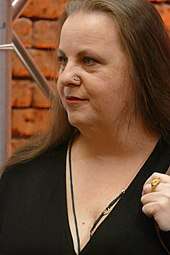Bettina Stangneth
Bettina Stangneth (1966) is a German philosopher.[1] Known for her work on antisemitism and National Socialism, she is the author of several books, including Eichmann before Jerusalem (2014), which won an NDR Kultur Sachbuchpreis (non-fiction book award) in 2011 when it was first published in German.[2][3][4][5]

Bettina Stangneth, 2016
Stangneth was awarded her PhD by the University of Hamburg in 1997 for a thesis on Immanuel Kant.[6]
Selected works
- (2000). Kultur der Aufrichtigkeit: Zum systematischen Ort von Kants Religion innerhalb der Grenzen der bloßen Vernunft. Würzburg: Königshausen & Neumann. ISBN 3-8260-1648-3
- (2003). Die Religion innerhalb der Grenzen der bloßen Vernunft/Immanuel Kant. Hamburg: Meiner. ISBN 3-7873-1618-3
- (2011). Eichmann vor Jerusalem: Das unbehelligte Leben eines Massenmörders. Zürich: Arche. ISBN 978-3-7160-2669-4
- (2014). Eichmann before Jerusalem: The Unexamined Life of a Mass Murderer. New York: Alfred A. Knopf. ISBN 978-0-307-95967-6
- (2012). Lüge! Alles Lüge! Aufzeichnungen des Eichmann-Verhörers Avner Werner Less. Zürich: Arche. ISBN 978-3-7160-2689-2
- (2017). Lügen lesen. Reinbek: Rowohlt. ISBN 978-3-498-06173-9
- (2019). Hässliches Sehen. Reinbek: Rowohlt. ISBN 978-3-498-06448-8
gollark: btw I used arch
gollark: I'm *sure* Arch has a Java 8 package...
gollark: You can't use javas above 9 for Minecraft.
gollark: For turtle swarms.
gollark: Valithor's proprietary swarm mining software.
References
- "Thinking Evil". Rowohlt.
- "Bettina Stangneth". Penguin Random House.
- "Celebration of Lying". Maastricht University, 5 November 2019.
- Fraum, David (8 October 2014). "The Lies of Adolf Eichmann". The Atlantic.
- Teicholz, Tom (18 April 2015). "The Liar: The Four Personas of Adolf Eichmann". Los Angeles Review of Books.
- Stangneth, Bettina (2000). Kultur der Aufrichtigkeit: Zum systematischen Ort von Kants Religion innerhalb der Grenzen der bloßen Vernunft. Würzburg: Königshausen & Neumann. OCLC 45898008
Further reading
- Evans, Richard J. (17 October 2014). "Eichmann Before Jerusalem: The Unexamined Life of a Mass Murderer – review. The Guardian.
This article is issued from Wikipedia. The text is licensed under Creative Commons - Attribution - Sharealike. Additional terms may apply for the media files.